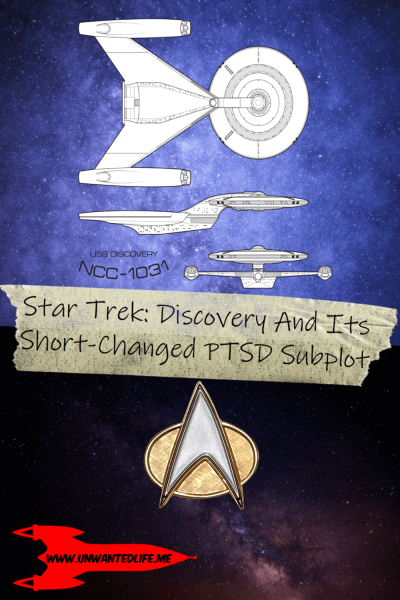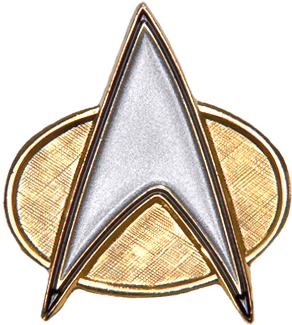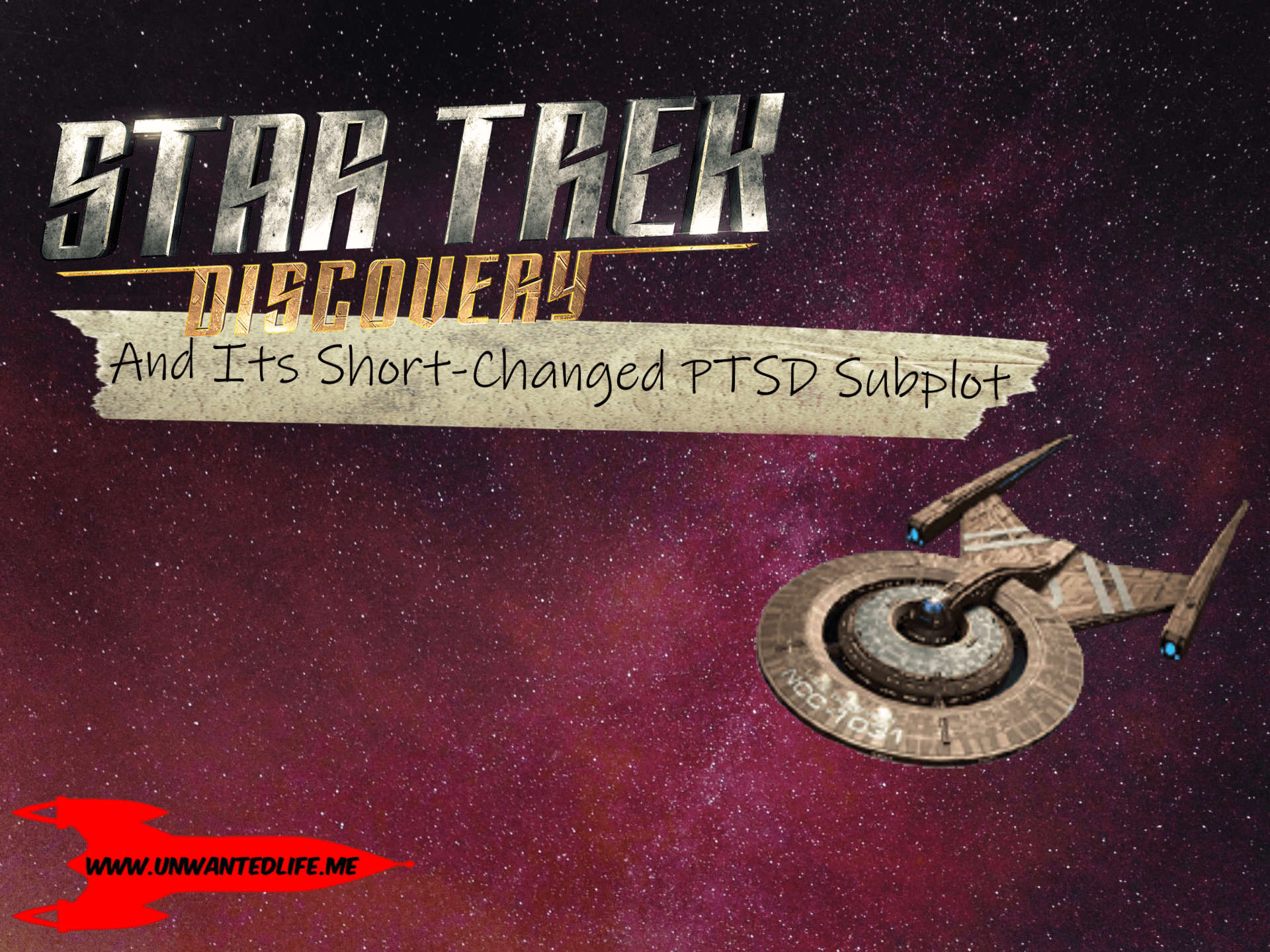Star Trek: Discovery is a real love it or hate it kind of Star Trek show. But all that aside, why did the show introduce a post-traumatic stress disorder (PTSD) subplot to one of the main supporting characters that could have developed them more for the audience, to then do us dirty?
In order to try to avoid spoilers, I’m going to avoid using character names where possible and avoid talking about any of the other plots of the show. However, just in case:
Potential Spoilers Ahead
Synopsis Of Star Trek: Discovery
The basic synopsis of Star Trek: Discovery is as follows:
Ten years before Kirk, Spock, and the Enterprise, the USS Discovery discovers new worlds and lifeforms as one Starfleet officer learns to understand all things alien
But over its three seasons, it’s basically taken a life of its own with it potentially, in my opinion, by placing itself in a timeline none of the other Star Trek shows inhabit. Season three is where the PTSD subplot takes place within this new timeline. This season, season three, takes over from where the crew of Discovery travel to over 900 years into the future, making them a living antique in their new present in all but one, very important, way.
This has allowed the writers to explore a completely unsaturated time period for the franchise, although some of the aspects they decided to go with, in my view, weren’t great. But that’s beside the point.
What is PTSD?
Anyone exposed to a traumatic event or a series of events that results in causing trauma can develop PTSD. According to PTSD UK, PTSD is a memory filing error disorder, although it’s better known for sufferers reliving flashbacks and nightmares related to their trauma (NHS).
The Subplot
Lt. Keyla Detmer, as played by Emily Coutts, develops PTSD right off the bat in season three of Star Trek: Discovery. Some people might at first try to write it off as something else, like a cybernetic implant malfunction, but to me, it was clearly only one thing: PTSD. So what happened to cause this?
Well, the starship Discovery travels to the future through a wormhole, which forces them into what is basically a graceful crash landing. This crash landing was only achieved through the skills of the pilot on Discovery, Lt. Keyla Detmer, who had to pull off a thermal roll, whatever that meant. Anyway, they crash-land with minimal casualties. However, what should have been a great relief was anything but for Lt. Keyla Detmer as she started to show signs of PTSD after barely surviving this life-or-death situation.
After Lt. Keyla Detmer gets the once over in sickbay, she’s cleared for duty, but something is amiss. As Lt. Keyla Detmer returns to her duties as a pilot and tries to take off with the ship, she experiences what to me seems like classic PTSD symptoms. These symptoms start to interfere with her ability to do her task, which puts the Discovery in danger. This then becomes a small but recurring pattern.
As the episodes came and went, it started to seem like the crew of the starship Discovery had begun to notice that Lt. Keyla Detmer was struggling with something. After a freakout in episode four, Discovery’s main co-star doctor, Dr Hugh Culber, played by Wilson Cruz, asks if she’s ok and starts to seem like the doctor has finally realised their something wrong with Lt. Keyla Detmer.
However, by the next episode, nothing is done with this scene between Dr Hugh Culber and Lt. Keyla Detmer and it’s never spoken of again. This just doesn’t make sense for Dr Hugh Culber, who has had his own very traumatic experience that caused him mental health problems. Thus, we find Lt. Keyla Detmer back at her post and experiencing PTSD on the job, like it’s not a bad idea.
In one episode, however, Lt. Keyla Detmer needed another crew member to interject in order to pull herself back together when she experienced PTSD symptoms. It boggles the mind that she hasn’t been put on medical leave and been given a treatment plan, so she could work on her PTSD, allowing her to recover so she can return to her post when and if she’s ready.
As I watched episode seven, I realised the PTSD seems to have disappeared from the storyline, and I really wasn’t sure if they would bring it back at a later point or not. Given that they certainly haven’t made any reference to treatment for it, it seems like that would be the likely outcome. Ideally, it would mean if it does return, it is likely to be a factor in something that almost gets everyone killed in a key plot point.
In episode eight, Lt. Keyla Detmer talked about needing fail-safes being added, with their friend saying they never needed them before. Therefore, this would indicate that nothing had improved in regards to Lt. Keyla Detmer’s PTSD and that there’s been no off-camera treatment. It would also suggest that no one on the crew still hasn’t picked up on the PTSD either.
My ideal outcome for a way to bring focus to the importance of getting treatment for PTSD never came to fruition. I hoped that the PTSD subplot would have led to a big incident where the overlooked PTSD led to an unnecessary life-or-death event. It seems the scriptwriters had other ideas and have allowed Lt. Keyla Detmer to conquer her PTSD by doing a dangerous flying mission, fixing everything like magic. After that, no more symptoms of PTSD. If only we could all get better like that.

Star Trek: Discovery: Review Of The Subplot
In the Star Trek universe, they have access to medical technology that can pretty much deal with any and all physical health issues with minimal effort. However, mental health ones are still common long-term problems. This is why it was weird that no one seemed to recognise Lt. Keyla Detmer with quite obvious PTSD symptoms.
Furthermore, how come the crew of Discovery doesn’t have an onboard counsellor as they did in Star Trek: The Next Generation? Especially because in Star Trek: The Next Generation, Lieutenant Reginald “Reg” Barclay became addicted to using the holodeck due to finding it easier to form and maintain relationships there than in the real world. Therefore, it’s likely he suffered from social anxiety before developing this addiction.
They dedicated an entire episode to exploring the character’s holodeck addiction, which was called Hollow Pursuits. Using the show to talk about holodeck addiction (or Holodiction) for non-substance abuse would have been an eye-opener for a lot of people who might not have considered that other forms of addictions existed, especially in the early 90s. They then touched upon this addiction again in Star Trek: Voyager’s Pathfinder episode. So why didn’t the writers for Star Trek: Discovery not want to carry on this tradition and properly tackle PTSD?

Times have changed since Star Trek: The Next Generation and Star Trek Voyager, with shows needing more action to keep people watching, instead of slowly dripping the subplot over several episodes rather than dedicating an entire episode to a subplot. Which would be fine, if none right, but it all amounted to nothing, which is a real shame.
PTSD would seem like a likely condition a lot of people would be at risk of developing in the Star Trek universe, given the stressful situations they often find themselves in.
The writers should have done this PTSD subplot justice. It could have helped other sufferers, military, first responders, and even regular people seek help if it had been done right, rather than the character just magically fixing themself. This magical fix can give the wrong impression of PTSD and make sufferers feel inadequate for not being able to “just get over it” as Lt. Keyla Detmer did.
I know the Federation is meant to be an idealised existence, free from petty things like capitalism and greed, but that doesn’t mean mental health wouldn’t be as much of an issue in their universe as it is in ours. Sentient life comes with the risk of mental health issues. Even animals can have mental health issues like neurosis from poor treatment.
The sloppy PTSD subplot was a failed character development on several levels, not just for Lt. Keyla Detmer who was experiencing PTSD, but also for their crewmates, seeing who helped, who didn’t know how to help, and who didn’t want to help. Instead, we’re left thinking that none of the crew cared enough to help Lt. Keyla Detmer deal with very visible PTSD, putting everyone’s lives at risk in the process.
Star Trek: Discovery: Bonus
Although the show did us dirty on the PTSD mental health storyline and character development, the show at least expanded on its inclusiveness. The show added a character that wanted to be referred to by they/them prefix, as the character stated they never felt like their birth gender identity. The show also has two gay male characters who are in a relationship as well. But I won’t tell you who any of these characters are in case you haven’t watched the show yet.
It’s nice to see them carry on the tradition first started in Star Trek: The Original Series, where they aired the first interracial kiss on TV on the 22nd November 1968. What’s more, the kiss was with the first black woman to have a continuing co-starring role as well. A couple of milestones right there.

As always, leave your feedback in the comments section below. Also, feel free to share your experiences of PTSD, your thoughts on the PTSD subplot on Star Trek: Discovery, and your thoughts on Star Trek: Discovery as a show in the comments section below as well. If you want to stay up-to-date with my blog, then sign up for my newsletter below. Alternatively, get push notifications for new articles by clicking the red bell icon in the bottom right corner.
Lastly, if you’d like to support my blog, then you can make a donation of any size below as well. Until next time, Unwanted Life readers.


Being honest I used to watch Start Trek when I was younger at my grandparents house, but never went on with it so can’t really say much about it. As you said though, if you want to use a show to highlight PTSD it should be given its space and not rushed over like nothing had happened. Thank you for sharing!
The weird thing about their poor use of the PTSD subplot, the interviews with the people of the show seem to think they did a good job with it, which I find dumbfounding
I remember Star Trek from being a kid but it wasn’t really my thing – I am more into scifi now tho. I am totally with you, shows like this have such a great platform to show things like PTSD, they should make every effort to do it justice!
Rosie
The way they ended it felt very much like “why don’t you just get over it” so she did
I am a Star Trek fan! I need to start out by venting about how I can’t watch Discovery because I don’t have CBS access. (I saw the first season with a free week and binged, but that’s it.) CBS is horribly greedy and I refuse to subscribe. It’s no wonder that they’ve botched up a subplot! I expect nothing less. Sour grapes? Clearly!
Is it not on Netflix in America? You could try using you Netflix account online with a proxy to view the series, as that might work
Haven’t seen Star Trek but boy does it remind me so much of BBT! I really like how you related Star Trek’s subplot about PTSD to your blog as it’s important for your readers to get your message about this. Your voice matters so much. Thanks for sharing xx
http://www.lifebeginsattwenty.com
Thank you
Star trek has never really done good mental health stories. I really related to Barkley’s social anxiety and the fact that his crewmates were really no understanding and mean to him despite him being a brilliant engineer. Even the wise captain who himself had PTSD was awful. I felt like shouldn’t people in the 23rd century be more aware and empathetic to those suffering from mental illness?
One would hope that people of the future with all the advancements in society, would be a lot further down the road with understanding and supporting mental health
I have not seen this show but was at a the comic con panel for the show a couple of years ago and did see trailers and previews for the new season. My father is really into Star Trek. I was happy to see the diversity in casting but was unaware of the mental health issues that were written into the plot. It’s sad to read that they had begun a story that many people could have related to just to not properly finish the plot. Personally for me that suffers with anxiety I have been frustrated with the glamorous versions of anxiety and how some people thinks it’s cool to just say they have anxiety when there are real people suffering with it. I hope media such as tv and movies start showing a more realistic version of mental illness. One movie that I watched recently that I felt portrayed mental illness more realistic was “Words On the Bathroom Wall” I enjoyed watching that movie.
It certainly would have been better to properly tackle the mental health issues rather than presenting the very unlikely image that people can just snap out of it one day without doing a thing about it
Star Trek was never my thing, but I remember for when I was younger. I don’t understand why they don’t given I space to highlight PTSD. It was a lost opportunity ? thanks for sharing ?https://uncuaderno4cero.wordpress.com/
You’d think that with the dangers that exist in space and space travel, PTSD and other mental health issues would be a lot more common, thus important to write about, even in fiction
Thank you for sharing this.
??
Very interesting. I also found that strange and obviously didn’t fit with the story arc. Season 3 felt to me like a show with no direction. Unlike Next Gen which had clear characters and development.
Next generation was my favourite series, but then you also got more episodes per season back then, which the last two editions to the franchise seem to have abandoned
I love star trek and this was so interesting to read! Great post! Siobhan ♡ | Vegan Babe Life
Star Trek is awesome
I haven’t seen season three yet, but overall this series has disappointed me. The characters don’t live up to expectations, the stories are a huge stretch, even for the Trek universe and I just haven’t enjoyed this series much. And this just makes me shake my head even more as mental health is something our society is struggling to remove stigma from and the show sugarcoated it by making this character recover on her own, and not address it. Yes, there is no ship’s counsellor, but that’s because this is set pre OST and that role didn’t exist yet. At least, that has always been my understanding of the universe. However, that doesn’t excuse the way this was handled on the show. They could have it with more tact and in a way that raised awareness.
I’m not much of a fan of this installment in the franchise, it seems like it was created by someone who either hasn’t seen Star Trek before or wanted to reboot the who thing.
Having the ships counsellor as part of the bride crew in Next Generation only makes sense because if the fact she was an empath, but one would assume one of the medical team would have training in mental health. NASA astronauts have to be carely picked due to the risks of someone having a breakdown in space, so you’d assume that kind of thinking would remain, even in the future. Even GPs have basic mental health training, so surely all medical doctors would have the same in order to graduate in the first place
I’m glad to hear they raised the issue of PTSD on the show, but sorry to hear they did not do it justice. Other series I’ve watched seem to be doing similar things – they mention PTSD in an episode or two, almost like they are going through the motions instead of treating the topic thoroughly. Hopefully more shows will take on the topic more thoroughly in the future! Joan https://kindness-compassion-and-coaching.com
Yeah, it would be nice if more shows did the topic justice. They seems to be setting up a PTSD storyline onthe TV show, SEAL Team. But we’ll have to see if they do it justice or not
I’ve never been really into the whole Star Trek universe, however, I am sad to hear that there was so much possibility only for the opportunity to be disregarded and overlooked in this way. That was the perfect way to address PTSD in a popular fandom, shining light on a mental health struggle that many face and yet few talk about. I really wish that popular television shows would make more of an effort of using their influence in a positive way in terms of pulling back the curtain on the truth about mental health.
Indeed. The way they deal with the PTSD storyline just gives the false image that people can just snap out if it when it suits them
I am a big Star Trek: The Original Series fan, but many of the sequel series’ have also done groundbreaking work! I admit I have not seen Discovery, so I appreciate that your points still make perfect sense to me despite having only your examples to go upon!
Many portrayals of people with PTSD and other mental health related strains in shows, I sometimes think, are just there to give the show a level of ‘inclusivity. How genuine the inclusivity is depends on if the character is truly a solid portrayal of someone with realistic symptoms or not. You can have characters with PTSD or you can gave PTSD with a character.
Thanks for sharing your thoughts!
Seeing more genuine representation would be nice because TV and film are affective mediums to educate us about such things
I decided to put off reading this article until I am caught up. I am only in season 2 right now and don’t want to take the chance of spoiling anything! I appreciate the warning. Disappointing that it sounds like it squandered a potential storytelling opportunity here. I guess I will judge for myself when the time comes. Sci-fi has always been a great vehicle for teaching and inviting introspection.
I’d love to know what you think once you’ve finished the third season
As promised, I have returned! I loved what they did with season three, particularly leaning into themes of connection and importance of empathy which proved key to saving the galaxy when all was said and done. 🙂 That said, I noticed the dropped Detmer subplot too! What a missed opportunity. Fine analysis!
Thank you. What do you think of Discovery overall? It’s covered a lot of ground in three seasons, from a new look for Klingons, parallel universe, time travel, and taking the show into a new Star Trek future. Although, I though the reason for the burn was a huge letdown, what about you?
Right. The reason for the burn was…. unexpected. But then again, I don’t know what I was expecting! I guess it was okay. The writers were burdened with high expectations, that’s for sure. It led to a fine arc for Saru at any rate. I like how Discovery is continually reinventing itself. I’ve always been a real sucker for time travel or parallel universe stories and here we got both. So I felt a bit spoiled. 🙂
I’m rarely a fan of time travel due to the paradoxes that come with it that are often left unresolved.
As for the burn military experiment gone wrong or, you know how the virtual particle borrows energy from its future self to create itself and the one-electron universe hypothesis, I thought it might be something like a mash up of that
Also, the due with the door in the middle of nowhere, is he a new entity or somehow connected to the Q?
Very interesting read. I was never a fan of star trek growing up, but I love the connection you made between this show and PTSD. It’s really sad that little emphasis was placed on one’s mental health in this show. Unfortunately back in the day, mental illness shunned upon so much, that many didn’t take time to devle into. It’s still so in some shows today too. It’s just sad and upsetting. Thanks for sharing
It would be nice if more shows put in real effort if they’re going to introduce mental health conditions into their plots
I need to brush up on some Star Trek apparently! This was a really interesting read. Definitely wish they would have resolved the PTSD plot more, but glad they’re at least trying to bring mental illness to light.
It is nice to see shows tackle mental health, but to portray that you can just snap out of it sends the wrong message